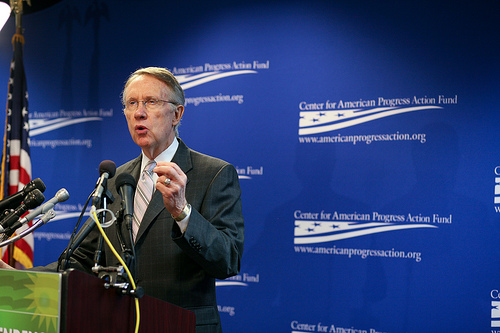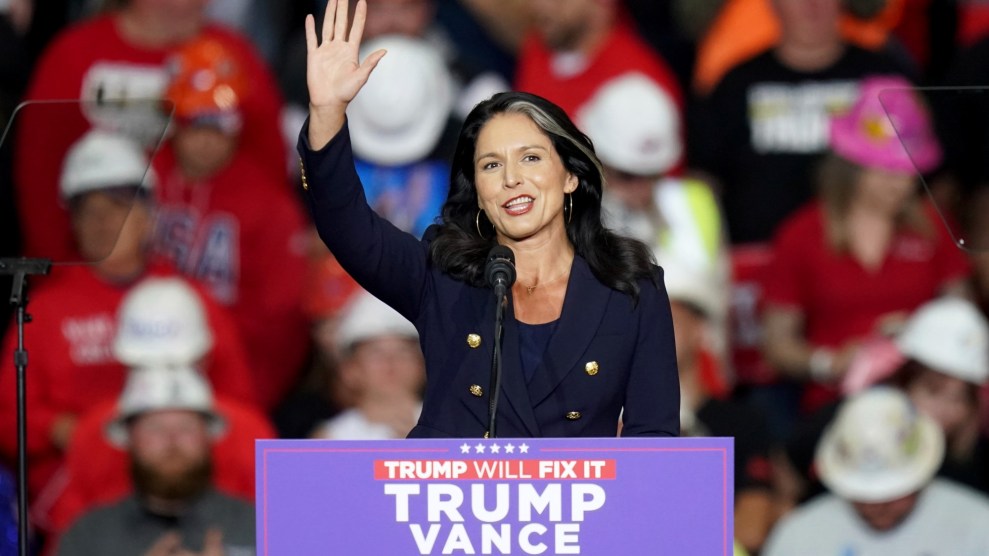
Sen. Majority Leader Harry Reid. Flickr/<a href="http://www.flickr.com/photos/americanprogress/3657601629/">Center for American Progress</a>
All this week, despite Republican threats to prolong or outright block the process, Senate Majority Leader Harry Reid (D-Nev.) said he wanted a swift finish to the Senate’s debate on financial reform. Right on schedule, Reid got what he wanted. This evening, the Senate passed its massive, far-reaching, historic overhaul of how Wall Street does business and how our financial markets function. The vote was 59-39.
Unlike the hyperpartisan nature of health care reform’s passage, the Senate’s victory tonight featured a modicum of Republican support. Sens. Scott Brown (R-Mass.), Olympia Snowe (R-Me.), and Susan Collins (R-Me.), all of whom voted for the cloture motion to essentially end the debate on financial reform earlier this afternoon, as well as Sen. Charles Grassley (R-Ia.) voted in favor. There were two Democratic defectors: Sens. Maria Cantwell (D-Wash.) and Russ Feingold (D-Wisc.), both of whom voted against the bill because they thought it wasn’t strong enough. Cantwell said changes were needed to the bill’s derivatives reform language, which right now doesn’t punish those who disobey the bill’s proposed rules. The Senate’s derivatives reform, in her view, is toothless. Meanwhile, Feingold said he believed the bill simply doesn’t do enough to prevent banks and non-bank financial companies from becoming too-big- and too-interconnected-to-fail.
Financial reform advocates and the Obama administration generally hailed the bill’s passage this evening. “Today we stand closer than ever to enacting meaningful financial reform that will benefit every American family and business, help improve the competitiveness of our financial markets, and strengthen the safety and soundness of our financial system,” said Treasury Secretary Tim Geithner. “This bill, while not perfect, takes significant steps to close those regulatory gaps and make our financial system both safer and more stable,” added Barbara Roper, director of investor protection at the Consumer Federation of America. Michael Calhoun, president of the Center for Responsible Lending, congratulated lawmakers but warned, “[C]oncerns remain. In this final stretch we hope lawmakers will resist Wall Street’s efforts to water down the bills’ strong provisions.”
Laying out everything the Senate’s bill proposes is too broad and wide-ranging to lay out in its entirety here. These are the highlights:
- The creation of an independent Consumer Financial Protection Bureau, located in the Federal Reserve, that would protect citizens against usurious interest rates; crack down on predatory lending, payday lenders, auto dealers, and other institutions who play a big role in extending credit to consumers; and try to boost financial literacy among those people who don’t entirely understand how mortgages or credit cards work.
- Brings transparency and stability to the trading of derivatives, the opaque financial products used to hedge risk and/or gamble on the financial markets. Right now, the $600 trillion derivatives market is mostly “over the counter”—meaning it’s in the dark, with little information about prices, trade volume, and the kinds of deals being done. The bill would force a majority—but not all—of these trades to go through clearinghouses that ensure everyone can cover their losses if their deals fail. The bill mandates derivatives be traded on transparent exchanges, like stocks are traded on the New York Stock Exchange. And a controversial provision from Sen. Blanche Lincoln (D-Ark.) to make big banks spin off their desks that trade “swaps,” a kind of derivative, remains in the bill, despite a furious lobbying effort to kill it.
- The creation of a council of regulators to guard against future too-big-to-fail scenarios. This council, made up of the biggest financial regulators in the US, would study financial data and take preventative action to prevent a bank from growing so large that its failure could topple the entire financial system, a la global insurer AIG in the fall of 2008.
- The bill gives the government the power to wind down and euthanize banks that somehow do become too-big-to-fail. While a proposed $50 billion fund, paid into by the banks, that would’ve been used to wind down big banks was killed, the bill empowers regulators to wind down and liquidate systemically risky banks. Moreover, those liquidation efforts, as the bill says, would not cost the taxpayers a nickel, unlike the infamous TARP bailout of 2008.
- The Federal Reserve’s multitrillion-dollar rescue of the world’s biggest banks—including Goldman Sachs—would be subjected to a one-time audit by the Government Accountability Office, the investigatory arm of Congress. A report on the Fed’s actions would be published by year’s end.
There are hundreds more provisions in the bill, too, that variously call for a crackdown on credit rating agencies, credit card companies, and many more culprits who helped cause the financial crisis. What the bill, as of Thursday evening, does not is do ban “proprietary trading,” when banks trade for their own gain instead of their clients’. Sens. Carl Levin (D-Mich.) and Jeff Merkley (D-Ore.) have sought to include an amendment of theirs that would ban prop trading, as it’s known, but the amendment has yet to get a vote. The Levin-Merkley amendment would essentially wall off more traditional bank operations from riskier investment bank outfits, while also preventing big banks from sponsoring risky private equity or hedge funds.
“We have missed an opportunity to strengthen that provision by putting in statute, without the ability of agencies to modify, prohibitions on risky trading by banks, and strict limits on such trading by nonbanks,” Levin said this evening. “Still, taken as a whole, the legislation before us is an important step toward policing Wall Street’s excesses and protecting current and future generations from the suffering that this crisis has created.”
The next step in the financial reform battle is merging the Senate and House’s reform bills. Which shouldn’t be too hard, as the Senate’s looks a lot House’s, passed back in December. One sticking point that comes to mind: While the House exempted auto dealers from oversight by the new consumer protection bureau, the Senate did not. Watch for a battle to unfold on whether that exemption makes it into the final bill or not.
Otherwise, with the two bills not that far apart, Reid and House Speaker Nancy Pelosi (D-Calif.) look to be on track to meet their July 4 deadline of putting a financial bill on President Obama’s desk.














